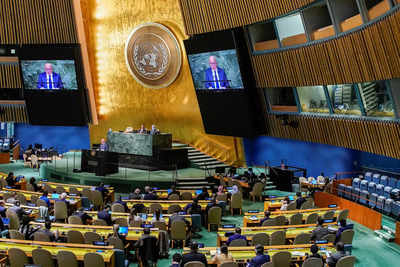
Image Source: TOI
As of the recent development in international affairs, India's decision to abstain from the call for truce has generated significant discussion and speculation. Several factors contribute to this diplomatic move, highlighting the complexities underlying India's foreign policy decisions.
Historical Context
India's foreign policy has long been shaped by its commitment to non-alignment and the principle of strategic autonomy. Its historical experiences, particularly during conflicts with neighboring countries, have influenced its stance on international conflicts and truces.
Geopolitical Considerations
From a geopolitical standpoint, India's abstention can be attributed to its delicate position in the region, considering its relations with neighboring countries and the evolving dynamics of international alliances. Balancing its national interests and regional stability has been a critical factor in India's decision-making process.
National Security Concerns
Given the persistent challenges to its national security, including cross-border terrorism and territorial disputes, India's priority remains the safeguarding of its sovereignty and the protection of its citizens. Any decision to engage in a truce requires a thorough assessment of its potential implications on national security.
Diplomatic Strategy
India's approach to abstain from the call for truce reflects its diplomatic strategy, emphasizing the need for comprehensive dialogue and sustainable peace-building measures. Prioritizing diplomatic channels for conflict resolution, India aims to foster long-term stability and constructive engagement in the region.
Global Partnerships
India's participation in various global forums and its growing partnerships with multiple countries shape its decision-making process. Balancing its global commitments while addressing regional challenges remains a key consideration for India, influencing its stance on international truce initiatives.
Conclusion
India's decision to abstain from the call for truce underscores the intricate interplay of historical, geopolitical, security, diplomatic, and global partnership factors. While emphasizing its commitment to peace and stability, India's abstention highlights the complexity of its foreign policy approach and the nuanced considerations guiding its international engagements.
In conclusion, India's stance on the call for truce emerges as a strategic maneuver aimed at safeguarding its national interests, promoting diplomatic solutions, and contributing to sustainable peace-building efforts in the region.